|
|
|
Sort Order |
|
|
|
Items / Page
|
|
|
|
|
|
|
| Srl | Item |
| 1 |
ID:
141250
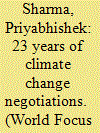

|
|
|
|
|
| Summary/Abstract |
Over the decades, climate change has emerged as an established wisdom of contemporary times. This has happened merely in the span of last three decades. Prior history of the science of climate change was full with controversy and debate. When at the turn of the nineteenth century the Swedish chemist Svante Arhenius (1896) proposed this hypothesis for the first time that man-induced carbon dioxide in the atmosphere of earth would lead to an increase in surface temperature through the greenhouse effect, not many took him seriously. To believe that the climate of earth was changing at a pace and scale far greater than the routine characteristic change forming part of the geological history of earth was too farfetched a contention at that time. For about next half a century as a result of some evidence it came generally to be agreed upon that some sort of climate change was happening but it still remained largely unclear whether this change had been happening in the direction of global cooling or that of global warming.
|
|
|
|
|
|
|
|
|
|
|
|
|
|
|
|
| 2 |
ID:
171624
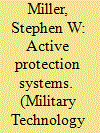

|
|
|
| 3 |
ID:
171230
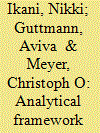

|
|
|
|
|
| Summary/Abstract |
This paper develops a novel theoretical framework for the conduct of postmortems after major foreign policy surprises for the European Union and its member states. It proposes a taxonomy of surprise which elucidates how officials or organisations experience both sudden and slower-burning threats. It argues that foreign policy surprises in European settings require a closer look at who was surprised, in what way, and when. The paper outlines six vital performance criteria and three key attenuating factors, allowing us to better ground judgements about foreign policy performance as well as to advance realistic recommendations on how to improve.
|
|
|
|
|
|
|
|
|
|
|
|
|
|
|
|
| 4 |
ID:
110876


|
|
|
|
|
| Publication |
2012.
|
| Summary/Abstract |
Reacting to Iraq's invasion and annexation of Kuwait, two European states, the United Kingdom and France, contributed large forces and participated in land, air, and sea operations. The contributions of these states varied considerably in their composition and role. The United Kingdom deployed as many forces (45,000 personnel) as the country could manage, while France sent a significant force (15,000) that fell short of its potential. Once in Arabia, the British played a major role in coalition planning, while the French remained operationally aloof. Finally, when it came to launch offensive operations, British forces were central to the coalition's riskiest endeavors, such as special forces raids and preparing a fake amphibious invasion, while French forces played a credible, but less dangerous role. This article tests the ability of realism and historic institutionalism to explain these different responses to the 1990-91 Gulf Crisis. Although realism appears a priori to possess a high degree of explanatory power, a detailed process tracing analysis reveals that historical institutionalism can better account for the different outcomes observed.
|
|
|
|
|
|
|
|
|
|
|
|
|
|
|
|
| 5 |
ID:
111000
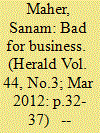

|
|
|
| 6 |
ID:
139297
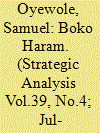

|
|
|
|
|
| Summary/Abstract |
The Boko Haram insurgency has emerged as one of the greatest threats to human security in Africa, and the Lake Chad region in particular. This is a region with a total area of 427,500 km2, which covers/ Cameroon, Chad, Niger and Nigeria. The movement known as Boko Haram (Western education is forbidden) originated in Nigeria in 2002. The official name of the movement is Jama’atu Ahlis Suna Lidda’awati Wal Jihad (People Committed to the Propagation of the Prophet’s Teachings and Jihad). The group was formed on the charismatic preaching of Yusuf Muhammad, which attracted hundreds of thousands of followers across northern Nigeria, Cameroon, Niger and Chad. The group’s campaign is informed by Islamic revivalism, widespread poverty, political corruption, repression and a weak justice system in the region.
|
|
|
|
|
|
|
|
|
|
|
|
|
|
|
|
| 7 |
ID:
139298
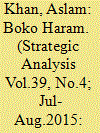

|
|
|
|
|
| Summary/Abstract |
Nigeria is currently going through a very delicate phase. The kidnapping of more than 275 Chibok schoolgirls by the terrorist organisation Boko Haram shocked not only Nigeria but the international community at large. This act by Boko Haram was widely criticised and led to worldwide condemnation and an international rescue effort. More seriously, the group leader Shekhau threatened to sell the girls into slavery and used Islamic teachings as justification.
|
|
|
|
|
|
|
|
|
|
|
|
|
|
|
|
| 8 |
ID:
132823
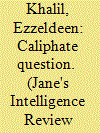

|
|
|
|
|
| Publication |
2014.
|
| Summary/Abstract |
The emergence of the Islamic State from its previous ISIL incarnation has reshaped the international jihadist community. Ezzendeen, Khalil analyses reactions to the group's metamorphosis among Islamist militant circles and its likely evolution.
|
|
|
|
|
|
|
|
|
|
|
|
|
|
|
|
| 9 |
ID:
141249
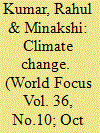

|
|
|
|
|
| Summary/Abstract |
The issue of climate change is one of the most vehemently debated topics in the national and international domain and it has its impact in almost all sectors of human existence, be it on health, economy, and environment and so on. According to United Nations Framework Convention on Climate Change (UNFCCC), change in climate is in one way or the other linked with human activity. It defines climate change as the change that can be attributed “directly or indirectly to human activity that alters the composition of the global atmosphere and which is in addition to natural climate variability observed over comparable time periods” A slightly different approach is adopted while defining climate change by Intergovernmental Panel on Climate Change (IPCC). IPCC has defined climate change as “change in the state of the climate that can be identified by changes in the mean and/or the variability of its properties, and that persists for an extended period, typically decades or longer. It refers to any change in climate over time, whether due to natural variability or as a result of human activity.
|
|
|
|
|
|
|
|
|
|
|
|
|
|
|
|
| 10 |
ID:
141245
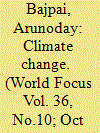

|
|
|
|
|
| Summary/Abstract |
There is no need to emphasize the fact that the climate change crisis is a major global challenge of our times. However, the climate change crisis is insurmountable, once it crosses the threshold. It threatens not only our present generations but also the future of entire humanity. The impacts of climate change, once set in, are not reversible in the short run. The assessment of the global warming trends and their likely adverse consequences is made by the Inter-Governmental Panel on Climate Change in its five Assessment Reports published respectively in the years 1990, 1996, 2001, 2007 and 2014. The gist of these reports is that the global mean temperature has increased by 0.3 to 0.6 degree centigrade in last 100 years but it is likely to increase by 0.3 C per annum in 21st century. The Synthesis Report of the Fifth Assessment Report (IPCL: 2014) remarks, 'Continued emission of greenhouse gases will cause further warming and long-lasting changes in all components of the climate system, increasing the likelihood of severe, pervasive and irreversible impacts for people and ecosystems'.
|
|
|
|
|
|
|
|
|
|
|
|
|
|
|
|
| 11 |
ID:
141246
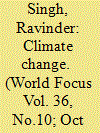

|
|
|
|
|
| Summary/Abstract |
Climate Change is a serious global environmental concern. It is primarily caused by the building up of Green House Gases (GHG) in the atmosphere. The global increases in carbon dioxide concentration (CO2) are primarily due to fossil fuel use and due to agriculture land use change yielding the methane and nitrous oxide. Global Warming is a specific example of the broader term “Climate Change”. It refers to the observed increase in the average temperature of the air near earth’s surface and oceans in recent decades. It is adversely affecting particularly the developing countries because they have neither the capacity nor the resources to deal with this challenge threatening the human existence (1). Scientific studies have proved the global atmospheric concentrations of most important Green House Gases-carbon dioxide (CO2), methane (CH4) and nitrous oxide (NO2) have increased markedly due to human activities since 1750.
|
|
|
|
|
|
|
|
|
|
|
|
|
|
|
|
| 12 |
ID:
141247
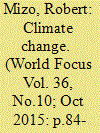

|
|
|
|
|
| Summary/Abstract |
Climate change warrants committed action from governments. No nation can afford to ignore the issue any longer given the ripening science behind it and the growing international attention. China and India have been under keen spotlight in the arena of international climate politics. This is because the two countries are major developing economies with rising emissions rates comparable to those of the developed west.[1] China and India share varied challenges emanating from the climate problem because they have to simultaneously grapple with issues typical to the third world. As developing economies, the two nations have to address the calls of human security, poverty, unemployment, development, etc. Addressing the problem of climate change is bound to shape how these countries plan to grow and develop in the future. In charting out their responses to climate change as developing countries with unique national circumstances, China and India have adopted certain ideational principles.
|
|
|
|
|
|
|
|
|
|
|
|
|
|
|
|
| 13 |
ID:
141236
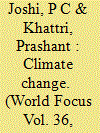

|
|
|
|
|
| Summary/Abstract |
The present article tries to locate the climate change diplomacy and politics within the larger framework of history and culture. Historical roots of climate change diplomacy are linked with scientific discoveries and a North-South geo-political binary. The climate change diplomatic negotiations are located within the backdrop of cultural theory and grand narratives of different geographical spaces. Broadly there are three cultural narratives regarding climate change that originate at different places and attribute different causes for climate change and hence float different solutions to tackle the problem. The contemporary mantra for a climate deal should be an integration of various narratives and stories rather than the competition of claiming one or the other as the main narrative and ignoring the other.
|
|
|
|
|
|
|
|
|
|
|
|
|
|
|
|
| 14 |
ID:
141243
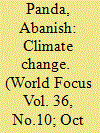

|
|
|
|
|
| Summary/Abstract |
Climate change is the result of global warming, which in turn is due to burning fossil fuels for steam and electricity generation. Accumulation of anthropogenic carbon dioxide in the earth atmosphere causes greenhouse effect. Disastrous consequences are melting of glaciers, snow and ice sheets, rise in sea level, changes in rainfall pattern, frequent extreme weather events, heat waves, droughts, flash floods, yield loss of crops, ocean acidification, loss of biodiversity, land inundation, etc. Mitigation methods are fuel switching to renewable energy sources such as wind, solar, biomass and nuclear for energy generation. With the new mandate of Obama administration to switch over to renewables of coal based power plants in the US, the difference in appropriate response to climate change between Europe and North America will recede. This, if implemented, would usher a new lease of hope for the present and future generations.
|
|
|
|
|
|
|
|
|
|
|
|
|
|
|
|
| 15 |
ID:
141252
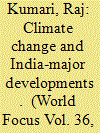

|
|
|
|
|
| Summary/Abstract |
Climate change is one of the main environmental challenges facing the world today. India is facing several problems. Climate change is associated with various adverse impacts on agriculture, water resources, forest and biodiversity, health, coastal management and increase in temperature Climate change would represent additional stress on the ecological and socioeconomic systems that are already facing tremendous pressure due to rapid industrialization, urbanization and economic development. This paper analyzes the efforts made by government of India to reduce the environmental challenges.
|
|
|
|
|
|
|
|
|
|
|
|
|
|
|
|
| 16 |
ID:
141255
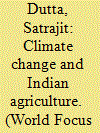

|
|
|
|
|
| Summary/Abstract |
Greenhouse effect is a natural process that produces the relatively warm and hospitable environment near the earth’s surface where humans and other life-forms have been able to develop and prosper. It is about non-normal variations to the climate mainly due to increased anthropogenic activities such as industrialisation, urbanisation, deforestation, agriculture, change in land use pattern etc. that leads to emission of increased level of green house gases (GHGs- carbon dioxide (CO2), water vapor (H2O), methane (CH4), nitrous oxide (N2O), hydrofluorocarbons (HFCs), perfluorocarbons (PFCs), and sulfur hexafluoride (SF6) etc.) which makes the rate of climate change much faster and so also its effects on Earth. The risk of climate change is largely a function of total cumulative GHGs in the atmosphere.
|
|
|
|
|
|
|
|
|
|
|
|
|
|
|
|
| 17 |
ID:
141235
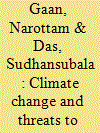

|
|
|
|
|
| Summary/Abstract |
What has rendered realist and neo-realist paradigm of security premised on state and its corresponding institutions redundant is the climate change. The source of security threats no longer lies with the state. The debate over the direct connection between climate change and security harks back to the day security threats were outsourced to non-military and non-traditional elements. There are skeptics who maintain that climate factors will only marginally influence tomorrow’s security environment, if at all. They point to significant natural fluctuations in climate patterns and short-term cyclical phenomena like El Nino and the recently identified Pacific Decadal Oscillation, the causes of which are not fully understood and deciphered. In their opinion, even if global warming does take place, many of its effects may be localized, benign or favourable.
|
|
|
|
|
|
|
|
|
|
|
|
|
|
|
|
| 18 |
ID:
141244
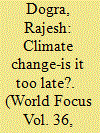

|
|
|
|
|
| Summary/Abstract |
The exact amount of climate change that is caused by human activities is not clear. However, it is clear that increasing greenhouse gas emissions result in warmer global temperatures and those human activities produce greenhouse gases. While climate change may not be caused by human activities alone, it is very likely that the changes observed during the last 50 years are not simply the result of natural causes. Is it too late to become part of the solution? No. We already have the knowledge and tools to start making changes.
|
|
|
|
|
|
|
|
|
|
|
|
|
|
|
|
| 19 |
ID:
141238
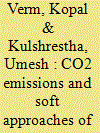

|
|
|
|
|
| Summary/Abstract |
During the last five years, India has achieved to become world’s ninth largest economy with a real GDP growth of 8.7% which is exceptional evidence of the growth of Indian economy [Energy Statistics, 2013]. Such a high economic growth involves enormous pressure on the energy resources of the country resulting in increased demand and supply imbalance across all energy sources. India’s energy basket has mixture of all the resources with the dominance of coal [Energy Statistics, 2013]. Being the capital of India, Delhi is the hub of opportunities for all including youth, entrepreneurs, governments, and the directly or indirectly associated people. This catalyses the processes of migration which is responsible for the growth of population, size of the urban area and industrialization [Aggarwal and Jain, 2014]. This further leads towards increased energy consumption posing serious environmental and human health threats. The worsening air quality of the city is triggering various respiratory problems such as chronic bronchitis, lung cancer and infections etc. Adverse air quality also affects visibility and climate, most of the time making irreversible changes. One such example is climate change which is difficult to cope by `hard’ mitigating methods due to human desires and geographical competitiveness for modern development. Due to these reasons many people believe that our climatic conditions will never be restored into the original form and adaptation is the only option for future generation. However, it is possible to reduce greenhouse gases (GHG) and carbon emissions by `soft’ techniques. Taking into account the consumption of fossil fuels by different sources and their emissions in Delhi National Capital Region (NCR), this article focuses upon the soft approaches to mitigate (GHG) and carbon emissions.
|
|
|
|
|
|
|
|
|
|
|
|
|
|
|
|
| 20 |
ID:
148816
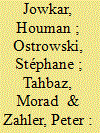

|
|
|
|
|
| Summary/Abstract |
Because of its diverse geological formations, climates, and soils, Iran is home to outstanding biodiversity. National conservation started in Iran over fifty years ago and today nearly 10 percent of the country is protected. However, biodiversity in Iran is threatened, with about 100 species of vertebrate fauna vulnerable or endangered. Increased population and human activity, climate change, drought, desertification, agriculture, poaching, and economic sanctions have helped create this crisis. Many of these causes can be mitigated through better planning, sustainable policies, and increased civil society and local engagement. Promoting awareness about the impacts of human practices will also be important for the long-term sustainability of Iran’s ecosystems. Iranian conservation NGOs have already taken an active role in preserving biodiversity.
|
|
|
|
|
|
|
|
|
|
|
|
|
|
|
|
|
|
|
|
|